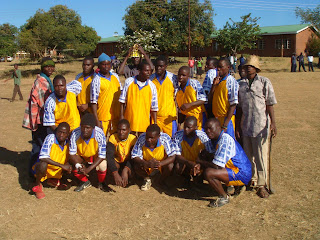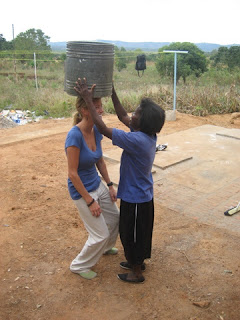
My IPSP was absolutely amazing—I loved Malawi, I loved all of the Malawian people, and I loved my work! On top of all this, I benefited from my IPSP so much more than I had imagined. I was definitely pushed to my limit and presented with new, interesting challenges. My capabilities were stretched, and my communication and leadership styles were tested. But everyday in Malawi I learned an incredible amount about myself, about humanity, about development, about the interconnectivity of all the world’s social problems, and so much more. Every single day in Malawi, I was stimulated, motivated, inspired, fulfilled, and educated.
I benefited from my IPSP in a number of ways, both short term and long term, both professionally and personally. I had never been a part of an integrated development effort in a developing country. So, for starters, I learned an enormous amount on how to effectively enter a country, work with other organizations and institutions, and catalyze sustainable economic growth. In my original IPSP Analysis, I hypothesized that my time in Malawi would educate me on how development programs are integrated across sectors, how to best approach social problems in a holistic, integrated way, and how to make these efforts scalable and sustainable by partnering with governments, other organizations, and communities. I did learn all of these things, but in very different ways than I had originally anticipated.
In the middle of my IPSP, I really started to feel as though I had a good grasp of the integrated development approach. After this realization, I immediately began to analyze the application of this approach by CHDI with a very critical eye. The more I learned, the more critical I became, and the more I realized that this fully integrated approach is so much more difficult than anyone realizes (even those working on development everyday). Although CHDI is not the perfect example (yet) of this integrated approach, I still learned a tremendous amount of what this type of approach requires and the difficulties that are likely to materialize along the way. I also learned a lot about developing successful collaborations and responding to market realities, both of which will inevitably help me in my career.
On a more personal note, I was correct in my IPSP Analysis in that this experience has definitely changed me as a person forever. My time in Malawi gave me a much broader perspective on the world and my place in it. Living amidst some of the world’s most devastating social problems, I became very in touch with the problems of the world. My own personal contributions to the global poverty trap also became frighteningly obvious. I became more in touch with humanity, and my compassion for others around the world most certainly intensified. Working with the Clinton Foundation, I gained a deeper sense of hope knowing that wonderful organizations are exerting their time, energy, skills, and resources to doing great things to resolve problems around the world. However, I also realized that the devastations of these problems are so much greater than the majority of the world’s population realizes and that resolving these problems is a much more daunting task than anyone is currently capable of realizing completely. I will forever see the world through a new and very different lens.
The Clinton Foundation also benefited much more than I had previously imagined. The Clinton Foundation benefited from my IPSP because of my intense commitment to CHDI’s purpose and goals in Malawi. I remained very flexible and adaptable throughout my entire project and, as a result, I was able to contribute to several areas of CHDI in a meaningful way. I worked very hard on my specific work-related activities, while also staying open to helping CHDI in other arising areas as they needed me. Because Tyler Denton had to travel to the United States for a couple of weeks in the middle of my IPSP, my presence in Neno was critical and invaluable. Along with my project tasks, I made myself immediately available to take on Tyler Denton’s responsibilities in Neno as well, which was extremely helpful. I became the main (on the ground) contact for all of the contractors, architects, Ministry of Public Works officials, construction evaluators, etc. that Tyler had been communicating with regularly regarding the construction of the hospital and twenty-three houses in Neno.
PIH also greatly benefited from my presence in Neno. Because of my flexibility, I was able to work on several more objectives in many different content areas. In my spare time, I helped PIH stock the Neno pharmacy with the necessary HIV, TB, Malaria, etc. medications for thousands of patients. I worked with PIH and the Ministry of Health on the planning and implementation of HIV-VCT trainings in Mwanza. I also helped Dr. Jon Crocker (PIH) in the HIV clinic. In conclusion, all parties involved in my IPSP benefited much more than I had originally predicted.
Before I left for the summer, I was completely prepared to have the best experience of my life. However, my IPSP experience exceeded all expectations and was so much more incredible than I could have ever imagined. I made a significant impact to CHDI and truly loved every minute of my work. My view towards international development work completely changed, and I strongly anticipate that my public service career will revolve around the eradication of poverty. After experiencing what I experienced in Malawi, it is close to impossible that my conscience will ever allow me to focus on any other issue in the world. Before this summer, I was intensely focused on women’s empowerment issues. However, empowering women is worthless if those women are dying because they do not have food to eat or clean water to drink. So many chords inside of me (most of which I never even knew existed) were struck this summer, and I have been changed forever. My entire experience in Neno, Malawi touched my heart in an extremely meaningful and very special way.
So, to all of my friends and loved ones, thank you so very much for everything you have done for me. I have dreamed of living and working in Africa since I was a very small child, and this summer my life-long dream came true. I have truly loved every single second spent here in Malawi, the “Warm Heart of Africa”. Thank you all for shaping me into who I have become—a young woman dedicated to serving others, inspired by places and things that seem to frighten most others, motivated by those who suffer, stimulated by the world’s complexities, angered by the world’s inequalities, and determined to make a difference.
Being placed in the village of Neno for the past couple of months was such a blessing. As Tyler Denton’s new boss (Bono) humbly stated, “there is much more to learn from Africa than there is to teach”. I cannot reiterate enough how accurate this statement truly is. I have learned more meaningful things in the past two months than I have in a lifetime. I learned about myself, the world, my place in the world, development, and so much more. I made incredible friendships with so many people, engaged in very meaningful work, and hopefully made a positive difference to the people of Neno. Nevertheless, what I have gained from my special relationships with the people of Neno has changed me forever and most certainly impacted me in the most positive of ways. I will carry the touching stories of Rose, Janet, Mary, Fortune, Elias, Frank, Dick, and Simeon in my heart for the rest of my life and hopefully someday pass on every wonderful thing they taught me to my children and grandchildren!
Again, thank you all for being who are you to me, thank you for everything you’ve done for me over the years, and thank you for shaping me into who I have become today. I only continue to pray that all of you continue to remain a strong force in my life, shaping me and molding me in the future, just as you have for the past twenty-three years. Thank you all for supporting me in this opportunity of a lifetime. Thank you for your encouragement. Thank you for your endless support. Thank you for your love. And most of all, thank you for your friendship.
GOD BLESS MALAWI AND GOD BLESS ALL OF YOU!!!























